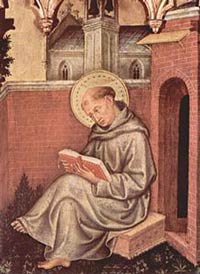
| Born: c. 1225 in Roccasecca, Kingdom of Sicily |
| Died: Mar 7, 1274 in Fossanova, Papal States |
| Nationality: Italian |
| Fields: Priest, Philosopher, Theologian |
| Famous For: he is a model teacher of the Catholic Church |
Thomas Aquinas was an Italian Dominican priest who was also a very influential philosopher and theologian in the tradition of scholasticism. Thomas was the first classical proponent of natural theology and also the father of Thomism.
Early Life and Education
Thomas was born in 1225 at Castle of Roccasecca, just a short distance from Aquino in Italy. At an early age of six, his parents decided to give him over as an oblate to the Benedictine monastery of the Monte Cassino. In 1239, he began his career where he studied at first in Paris and later in Cologne. While in Cologne, he studied under the help of Albert the Great. Later, he went back to Paris to further his theological studies.
Aquinas’ Professional Years
In 1256, he was licensed to be a teacher by University of Paris. In 1259, he travelled to Italy to teach before he went back to Paris. Thomas taught for a period of nine years at Orvieto, Anagni, Rome and also Viterbo. In 1272, at the age of 47, Aquinas relinquished his teaching duties so he could start a house of studies in Naples.
Aquinas’ Philosophical Contributions
The philosophy of Thomas Aquinas developed as a result of his special interest in studying Aristotle. His interest in philosophy also stemmed from being in contact with some Muslim scholars who also worked on reconciling Aristotle’s teachings with the beliefs of Islam. The reconciliation was very important because Aristotle was the main source for logic and physics in ancient times, although most of his teachings differed with the teachings of the Church Fathers and the Koran.
Published Works
Printed editions of Thomas’ work fill about 34 volumes. His publications include commentaries of several books of Bible, commentaries on works of Aristotle, and treaties on the philosophical issues. However, the most notable of his works are the two great summas, or “the summaries”, which include the Summa Theologiae and the Summa Contra Gentiles.
The Nature of God
One his most popular texts are his great five arguments, known as the Five Ways. In this writing, Aquinas uses philosophical arguments to show God’s existence. He believed that the existence of God is self-evident in itself, but not to us. He also believed God’s existence can be proven through motion natural things, the existence of the necessary and the unnecessary, gradation, and the ordered tendencies of nature.
Concerning God’s nature, Thomas proposed five statements to describe God’s divine qualities. They are: God is simple, God is perfect, God is infinite, God is Immutable, and God is one.
Aquinas’ basic composition is simply a rethinking of Aristotle’s thoughts in the light of Christian teachings. In most cases, he looked for a middle ground between the conflicting philosophical positions. His moderation can also be seen in his strong beliefs in regards to relation between our faith and learning.
Thomas Aquinas died at Cistercian monastery of the Fossanova on 7th March 1274.